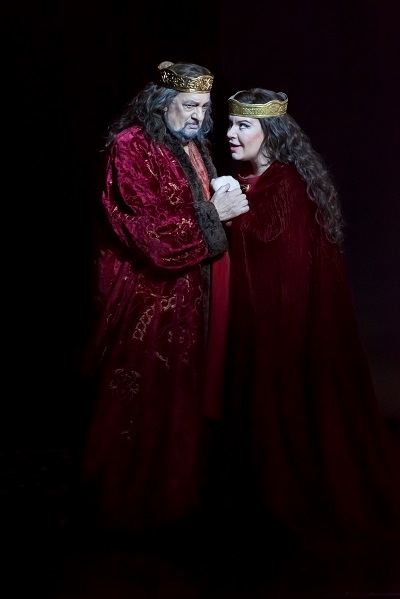 Spain Verdi, Macbeth: Comunitat Valenciana Orchestra, Generalitat Valenciana Chorus, Henrik Nánási (conductor), Palau de Les Arts, Valencia, 11.12.2015. (JMI)
Spain Verdi, Macbeth: Comunitat Valenciana Orchestra, Generalitat Valenciana Chorus, Henrik Nánási (conductor), Palau de Les Arts, Valencia, 11.12.2015. (JMI)

(c) Tato Baeza
Verdi, Macbeth
Production:
Direction: Peter Stein (original)/Carlo Bellamio (revival)
Sets: Ferdinand Wögerbauer
Costumes: Anna Maria Heinreich
Lighting: Joachim Barth
Cast:
Macbeth: Plácido Domingo
Lady Macbeth: Ekaterina Semenchuk
Macduff: Giorgio Berrugi
Banco: Alexander Vinogradov
Malcolm: Fabián Lara
Dame of Lady Macbeth: Federica Alfano
Medecin: Luis Martínez
Following October’s popular La Bohème performances by young singers, we now have Verdi’s Macbeth and the official opening of the opera season in Valencia. This is the revised Paris version of 1865 which eliminates the ballet; but here Macbeth’s final aria, cut from the original 1847 version, has been restored. The performance was very satisfying musically, and the cast was terrific.
In recent years I’ve suffered a kind of torture with Macbeth, and I can only express my gratitude that this Peter Stein production was not one more on my list of horrors. The staging premiered in Salzburg in 2011 and arrived in Rome later that year. It’s a minimalist production with no heavy sets. There’s an open space where the Macbeths’ palace is a moving element with just a door, and interesting props are added for the witches and banquet scenes. The costumes are well suited to Scotland in the Middle Age. Overall the production is very dark, but the lighting is excellent, particularly in the sleepwalking scene.
The direction was good, with excellent movement on stage by both chorus and extras. The least convincing part of the staging is the desire to show lots of blood, especially the scene that brings on stage the murdered Macduff’s children covered in blood while the chorus sings “Patria oppressa.” But apart from a few excesses, the production is attractive and narrates the plot well.
Conductor Henrik Nánási gave a convincing reading full of verve and drama, although at times his tempos were rather slow, especially in the last witches scene. What the musical direction revealed was the great value of the orchestra and chorus at the Palau de Les Arts. The first remains a superb group, although one does feel some nostalgia remembering the past, while the chorus did a splendid job. Today it is the best opera chorus in Spain, with only the Teatro Real chorus on the same level.
Plácido Domingo returned to Valencia and, as always, expectations were huge, as was the interest in a tribute to his miraculous career. I’ve said many times that his career is unique, and it is incredible that at almost 75 he retains such vocal freshness and physical agility. Domingo is not a baritone, as is well known, but he is an exceptional artist. He debuted in the character of Macbeth in Berlin last February, and is now repeating the role in Valencia. With regard to his vocal suitability, I will say that I have liked him better in other baritone interpretations, like Simon Boccanegra. There are times when one misses more consistency in the lower range, and his breathing capacity (which has never been exceptional) now is shorter, but the artist conquers everything. I referred above to the fact that the opera ended with the restored Macbeth aria, “Mal per me,” and I consider that a way of underscoring who the main attraction was.
Lady Macbeth, who is the true protagonist of both the opera and the drama by Shakespeare, was interpreted by Ekaterina Semenchuk. She is one of the best Verdi mezzo-sopranos today, as she has demonstrated in her frequent Azucenas, Amneris and Ebolis. However, Lady Macbeth is not a character for a mezzo-soprano and requires, in my opinion, a true spinto or dramatic soprano. A mezzo-soprano doesn’t become a full soprano just by reaching a high C, as has happened with other colleagues of hers, particularly Violeta Urmana. Ekaterina Semenchuk reaches high C, but her sound is metallic and the pitch is questionable. There’s no doubt that she is a great singer, and I think this was her debut in the role. The always anticipated sleepwalking scene was sung brilliantly until the high D flat, which is out of her reach, although she did not avoid it (which would have been rather better).
Macduff’s character is one of the best gifts that Verdi could give to a tenor. He has very little to sing: virtually just that most beautiful aria, “Ah, la paterna mano,” and Giorgio Berrugi was excellent in it. His performance was much more convincing than when he sang Verdi’s Requiem here two years ago.
Something similar can be said of the character of Banco, almost episodic, except for the aria “Come dal ciel precipita” in Act II. Bass-baritone Alexander Vinogradov did really well; he has an attractive voice and sang with gusto.
In the secondary characters, Fabián Lara was a remarkable Malcolm, with an attractive and wide tenor, and he should have a good future. A positive impression was left by Luis Martinez as the Doctor; and by Federica Alfano as the Dame of Lady Macbeth, who showed admirable vocal technique.
José M. Irurzun